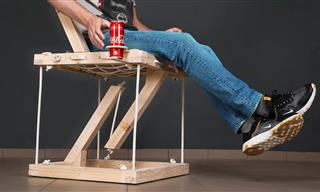
Winter is officially here, and with it, so are power shortages. They are, in part, caused by the outdated myths about electricity many of us continue believing. One of our mottos here at Baba mail is "knowledge is power." When the winter storms hit, and the power is down, use your myth-busting powers to save lives. Here we'll be pulling the plug on 9 deadly myths about electricity.
Plus, how come birds don't get electrocuted when they sit on power lines?

Let's use the right terminology: voltage isn't lethal, amperage is. As much as 1 ampere can cause fatal heart damage. An average household has 100 to 200 amps running through its circuits. So keep those fingers away from the power socket!
False! While some are, it would be unsafe to assume that all power lines are insulated, since the majority of them aren't. Insulation could also be lost in a storm. The bottom line is, it is simply never safe to touch power lines. The birds can do it though, since they don't touch the ground, thus closing the power circuit.

This is false. It depends on which surface the line falls on... But probably in 999 of 1000 cases, it will fall on a poor conductor, meaning the power line won't short circuit. Still, it is very much alive and dangerous! Stay 20 feet away from a fallen line. A fallen wire won't necessarily shoot sparks as well - only the hanging ones will. A power line that touches the ground won't spark.

Wood, like asphalt, is a poor conductor, but a conductor nonetheless. Wet wood is a much better conductor, thanks to water being an excellent conductor. Keep that in mind. 100% rubber gloves or shoes will also not conduct electricity. However, 100% rubber shoes aren't that easy to come by, and even your gloves may not be thick enough or truly 100% rubber. Take caution.

It depends. If you were to heat your entire home with electric heaters to the same temperature you would with an oil or gas furnace, the electric heaters would cost way more. But if you only use an electric heater in one room, or even in several rooms (only the occupied ones), then it would probably cost less than oil- or gas-fired furnaces.

False. Mose devices continue to use electricity when they're turned off. This is because they're not fully off. There's usually minimal activity still going on in the electrical device. If your device has a standby option, it will likely be about 100% off and not consume any electricity. This phenomenon is not what will spike your utility bill, but it is good to keep in mind for safety and sustainability reasons.
Now you can outsmart the ones who told you it takes a toll on the power to flick the lights on. There is no such thing as a startup penalty. This isn't like driving a manual gear car, where you travel gradually from first to fifth gear. Logic wins. You will always save energy by switching a device off. Tell that to the next person who tries to tell you it's better to leave the lights on continuously to save energy.

As every mother knows, it is best to steer clear of the power socket, as it can harm you. Household electricity has killed people before, especially when combined with water.
Fiberglass and wood are truly much safer than metal, but notice how we mention water-conductivity as a recurrent theme throughout this post. It is important to stress that a thing doesn't have to be drenched in water to become more conductive. Even the thinnest coat of dew will do. The only way to stay on the safe side is to work with de-energized circuits, or simply call a professional.
H/T: RD

The Health Benefits of Garlic and Honey: Nature's Powerful Duo
Garlic and honey are two of nature's most treasured foods, used for centuries to support health and wellness.

The Most Creative Snowmen, 2021 Edition
Enjoy a collection of 13 artful snowmen to inspire you and maybe give a good laugh!

Incredible! Teen Siblings Invent World-Changing Technology
If you can't afford gas or want to keep your bills low, this ordinary looking handheld lamp may be the solution.

Do Hangovers Really Get Worse With Age?
While research on this phenomenon is somewhat limited, science offers several compelling explanations for why that morning-after misery intensifies as the years go by.

New Research Shows Eating Sweets Won't Make You Crave More
A groundbreaking new study challenges conventional wisdom, suggesting our preference for sweet tastes may be more stable than we think.

8 Lies We've Been Told About Electricity
These incorrect facts about electricity have been perpetuated long enough. It's time to disprove them.
 10:04
10:04
11 Practical Technologies That Will Help Fight Flooding
These amazing innovations will be real handy during a flood.

Nobody Believed These 5 Scientists, But They Were Right
These 5 scientists were shamed and ousted, or rudely ignored, although years later, their "crazy" theories turned out to be true...

Do You Have One Of These RARE Genetic Traits?
How unique are you? You might have several rare genetic traits that make you unlike most of the world's population!
 5:01
5:01
The Truth About Folding Phones You Need to Know
Don’t buy a foldable without knowing this first.

2024's Biggest Breakthroughs in Science We Must Celebrate
These recent scientific breakthroughs could change the world.
 10:30
10:30
China's Crazy Plan to Dig a Canal in the Middle of EUROPE
China is setting out a plan to dig a canal through the middle of Europe in the nearest future, but why?
 15:41
15:41
Keep Your Home Safe with These Handy Gadgets
These 13 devices will transform your home security.
 13:21
13:21
The Race to Complete the World's Second-Tallest Skyscraper
Malaysia is all set to unveil the world’s second tallest skyscraper.

I Bet You Didn't Have a Clue About These Human Body Facts!
The human body is the most complex machine known to mankind, but I bet you don't know these 10 amazing facts about it...

Learn Chemistry Easily with This Interactive Periodic Table
This interactive table of elements has video lectures about every element, including experiments
 5:50
5:50
Why Do We Sometimes Hallucinate? Find Out Here!
In this informative TED-Ed video, Elizabeth Cox details the science of hallucinations.

What is the Troxler Effect and How Does it Affect You?
Learn about Troxler's effect and the optical illusions it creates in life.

Superwood: A New Material That Could Replace Steel
After decades of relying on steel—a material that produces nearly two tons of CO2 for every ton manufactured—builders may soon have access to something far more sustainable and surprisingly stronger: Superwood.

15 Beautiful Carl Sagan Quotes on the Stars and the Cosmos
A look at some profound quotes on the universe by famous astronomer and cosmologist Carl Sagan.
 38:55
38:55
What Happens the Deeper You Go Underground?
What happens when pressure pushes matter beyond the limits of what we thought possible?

The Most Remarkable Medical Breakthroughs of 2024
Here’s a look at some breakthroughs in medical innovation this year.
 8:12
8:12
How Humans Helped Cats Take Over the World
The relationship between humans and cats goes back as far as 9,500 years. How did it al start? And how did humans help cats essentially take over the world?

5 Puzzling Mysteries That Science Finally Managed to Solve
These weird occurrences have puzzled humanity for decades, if not centuries. Finally, scientists solved them & the solutions are exciting...
 21:51
21:51
What Will the Universe Look Like in 10 Quintillion Years?
These questions take us beyond science into the realm of imagination, as we contemplate the ultimate fate of our Universe and everything within it.

Earth Is So Incredible: I Was Stunned by These 50 Facts
Here's a post that will explain to you just what's truly, scientifically amazing about our planet Earth. I'm gobsmacked.
 15:34
15:34
This Stunning Video Visualizes the Size of the Universe
This video visualizes the number of galaxies in the world, giving you a look into the true size of our enormous universe.

This New Blood Pressure Drug Could Be a Game-Changer
Zilebesiran, an investigational drug that is showing profound success in late-stage clinical trials is offering hope for millions who struggle to keep their blood pressure in check.
 9:13
9:13
Want to Travel Quickly Through Space? Try Using a Wormhole
If you want to know what a wormhole is and how it is supposed to work, then you've come to the right place!

Hubble Telescope: 35 Years of Incredible Photos
Exploring 35 years of reality-changing, universe-enhancing photos that opened the sights of outer space to us all.

16 Interesting Things We Bet You've Never Seen Before
Once we have finished school and learned all the necessary skills at work, it may seem that no further studying is necessary. 16 interesting photos you wish you had seen in textbooks at school.

Science in 2025: 8 Developments That Could Change it All
Here are some of the most exciting trends in science and healthcare to keep an eye on.
 5:14
5:14
Earth 2125: A Vision of the Future of Our Planet
Exploring what Earth could look like in 2125 reveals exciting potential.
 10:59
10:59
Fascinating Science: How Sand is Turned Into Glass
Have you ever looked through a window and wondered how it was made from simple beach sand? This video shows you that incredible process.
 16:31
16:31
Why Building a Perpetual Motion Machine Is Impossible
Since the Middle Ages, scholars have been trying to build the mythical perpetual motion machine. Was it all in vain? Is it even possible to build such a machine?
 9:09
9:09
Protective Measures: How Our Body Reacts to a Tattoo
In this video, we’ll explore the microscopic war raging beneath your skin, where millions of your cells make the ultimate sacrifice to lock that ink in place, turning a defense mechanism into lifelong art.

10 Fascinating Facts About the Subconscious Mind
10 facts about the way the subconscious mind works
 4:57
4:57
The First 3D-Printed Hotel is Already Being Built!
s evidence of this, a groundbreaking project is nearing completion, in which a hotel is being printed, and tourists will soon be able to visit it. Curious to see what it looks like?
 8:12
8:12
The Tallest Statues Compared, Even Those Not Built Yet...
In this 3D animated size comparison, we showcase the tallest statues in the world alongside ambitious future projects.
 4:40
4:40
How to Make a Floating Chair
If you have some rope and wood - you too can build this floating chair!

13 Astonishing Things You Never Thought You'd See
Here are 13 photos of rare phenomena you never thought you'd see!

Alzheimer's: What Recent Breakthroughs Have Taught Us
Now, you can discover 4 new studies that show how to do this in ways you haven’t heard of.
 5:22
5:22
Why Do You See Colors When You Rub Your Eyes?
Explore the science of afterimages, the visual illusions that linger in your vision following exposure to bright lights or images.

Study Shows Seniors Still Grow New Brain Cells Daily
A new study shows that even the elderly keep on growing new brain cells, which could be the breakthrough the scientific community was waiting for...
 11:28
11:28
India Built a Monster Dam That Controls the Weather!
The Polavaram Dam doesn't just control floods - it moves water between regions and much more!

10 Obscure Inventions by World Famous Inventors
We’d like to bring your attention to 10 lesser-known inventions of famous figures in history, which will reveal a new and different side of these inventors to you.
 5:28
5:28
Just How Small is an Atom? - Fascinating!
Just how small are atoms? And what's inside them? The answers turn out to be astounding...
To enable your Ad-Free Subscription, please fill the fields below
Your subscription was successful, now you can enjoy an ad-free experience!! Note: To make sure you get no ads, please make sure to log in to your account. If you are logged in already, then refresh the page. The subscription can be cancelled at any time.


